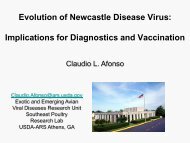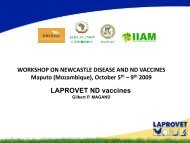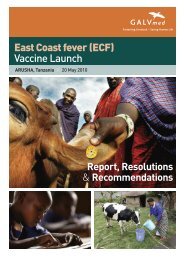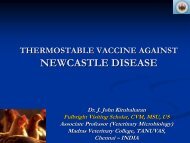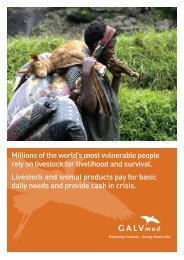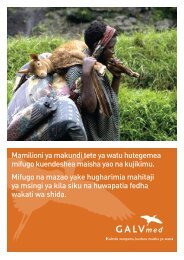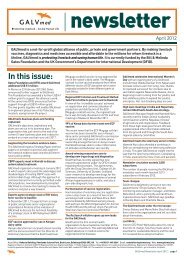A Path to Prosperity New Directions for African Livestock
GALVmed Impetus Strategy Paper
GALVmed Impetus Strategy Paper
- No tags were found...
Create successful ePaper yourself
Turn your PDF publications into a flip-book with our unique Google optimized e-Paper software.
One of the problematic issues over the past<br />
decades has been the reluctance of the veterinary<br />
establishment <strong>to</strong> allow private vets <strong>to</strong> legally utilise<br />
veterinary para-professionals (para-vets) <strong>to</strong> boost<br />
their business viability. The para-vet can increase<br />
the area a private practice covers, build links with<br />
widely-dispersed and often inaccessible clients,<br />
increase turnover and make a business<br />
profitable 73 74 75 . This reluctance is based on<br />
concerns about quality of service, accuracy of<br />
diagnoses, un-controlled drug distribution, the<br />
possibility of drug residues and the quality of advice<br />
given 76 . These are legitimate concerns that do need<br />
<strong>to</strong> be managed. The concerns are compounded<br />
by fears within the profession of not being able<br />
<strong>to</strong> replace para-vets with vets once para-vets are<br />
legally recognised. However there is some evidence<br />
that attitudes are slowly changing. Since 2004, OIE<br />
guidelines allow <strong>for</strong> veterinary para-professionals 7 77 .<br />
A survey of chief vets carried out by OIE in 2009<br />
showed a generally positive attitude <strong>to</strong>wards<br />
para-professionals and CAHWs and that these<br />
cadres were the preferred options <strong>to</strong> leveraging<br />
and extending the services availed by vets <strong>to</strong> small<br />
farmers 78 . Un<strong>for</strong>tunately, these favourable attitudes<br />
are rarely supported by regula<strong>to</strong>ry change. Senior<br />
vets may turn a blind eye <strong>to</strong> the use of para-vets <strong>for</strong><br />
surveillance and outbreak control in remote areas<br />
because they know there are few practical<br />
alternatives, but don’t provide the legal recognition<br />
that a private practice would need <strong>to</strong> utilise<br />
para-vets as business strategy. The scaling up of<br />
private practices that utilise para-vets there<strong>for</strong>e<br />
remains slow, despite strong evidence of their<br />
effectiveness 79 80 81 82 83 (Box 4). Scaling up<br />
profitable private practice in rural Africa using<br />
veterinary supervised para-vets is, arguably,<br />
a quick win in terms of addressing producer<br />
competitiveness and complementing improved<br />
drug quality. Despite the evidence mentioned in<br />
Box 4, the sustainability of mechanisms using<br />
teams of veterinarians supported by veterinary<br />
para-professionals in remote areas still needs<br />
further testing in SSA .<br />
7 A Veterinary para-professional: means a person who, <strong>for</strong> the purposes of the OIE Terrestrial Code, is authorised by the veterinary statu<strong>to</strong>ry<br />
body <strong>to</strong> carry out certain designated tasks (dependent upon the category of veterinary para-professional) in a terri<strong>to</strong>ry, and delegated <strong>to</strong> them<br />
under the responsibility and direction of a veterinarian. The tasks <strong>for</strong> each category of veterinary para-professional should be defined by<br />
the veterinary statu<strong>to</strong>ry body depending on qualifications and training, and according <strong>to</strong> need.<br />
The Impetus Strategy Paper I Page 31



